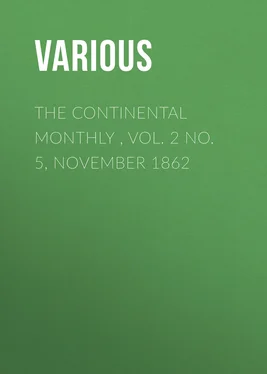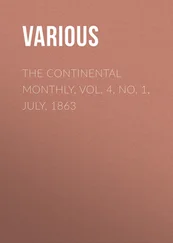Various - The Continental Monthly , Vol. 2 No. 5, November 1862
Здесь есть возможность читать онлайн «Various - The Continental Monthly , Vol. 2 No. 5, November 1862» — ознакомительный отрывок электронной книги совершенно бесплатно, а после прочтения отрывка купить полную версию. В некоторых случаях можно слушать аудио, скачать через торрент в формате fb2 и присутствует краткое содержание. Жанр: foreign_antique, periodic, Языкознание, Политика, foreign_edu, на английском языке. Описание произведения, (предисловие) а так же отзывы посетителей доступны на портале библиотеки ЛибКат.
- Название:The Continental Monthly , Vol. 2 No. 5, November 1862
- Автор:
- Жанр:
- Год:неизвестен
- ISBN:нет данных
- Рейтинг книги:3 / 5. Голосов: 1
-
Избранное:Добавить в избранное
- Отзывы:
-
Ваша оценка:
- 60
- 1
- 2
- 3
- 4
- 5
The Continental Monthly , Vol. 2 No. 5, November 1862: краткое содержание, описание и аннотация
Предлагаем к чтению аннотацию, описание, краткое содержание или предисловие (зависит от того, что написал сам автор книги «The Continental Monthly , Vol. 2 No. 5, November 1862»). Если вы не нашли необходимую информацию о книге — напишите в комментариях, мы постараемся отыскать её.
The Continental Monthly , Vol. 2 No. 5, November 1862 — читать онлайн ознакомительный отрывок
Ниже представлен текст книги, разбитый по страницам. Система сохранения места последней прочитанной страницы, позволяет с удобством читать онлайн бесплатно книгу «The Continental Monthly , Vol. 2 No. 5, November 1862», без необходимости каждый раз заново искать на чём Вы остановились. Поставьте закладку, и сможете в любой момент перейти на страницу, на которой закончили чтение.
Интервал:
Закладка:
Various
The Continental Monthly , Vol. 2 No. 5, November 1862 / Devoted to Literature and National Policy
THE CAUSES OF THE REBELLION
No other nation was ever convulsed by an internal struggle so tremendous as that which now rends our own unhappy country. No mere rebellion has ever before spread its calamitous effects so widely, beyond the scene of its immediate horrors. Just in proportion to the magnitude of the evils it has produced, is the enormity of the crime involved, on one side or the other; and good men may well feel solicitous to know where rests the burden of this awful responsibility.
The long train of preparatory events preceding the outbreak, and the extraordinary acts by which the conspirators signalized its commencement, point, with sufficient certainty, to the incendiaries who produced the vast conflagration, and who appear to be responsible for the ruin which has ensued. But it remains to inquire by what means the great mass of inflammable materials was accumulated and made ready to take fire at the touch; what justification there may be for the authors of the fatal act, or what palliation of the guilt which seems to rest upon them. The reputation of the American people, and of the free government which is their pride and glory, must suffer in the estimation of mankind, unless they can be fairly acquitted of all responsibility for the civil war, which not only desolates large portions of our own country, but seriously interferes with the prosperity of multitudinous classes, and the stability of large industrial interests, in other lands.
Neither in the physical nor in the moral world, can the effects of any phenomenon go beyond the nature and extent of its causes. Mighty convulsions, like that which now shakes this continent, must have their roots in far distant times, and must gather their nutriment of passion and violence from a wide field of sympathetic opinion. No influence of mere individuals, no sudden acts of government even, no temporary causes of any nature whatsoever, are adequate to produce results so widespread and astounding. The social forces which contend in such a conflict, must have been 'nursing their wrath' and gathering their strength for years, in order to exhibit the gigantic death-struggle, in which they are now engaged.
Gen. Jackson, after having crushed the incipient rebellion of 1832, wrote, in a private letter, recently published, that the next attempt to overthrow the Union would be instigated by the same party, but based upon the question of slavery.
That single-hearted patriot, in his boundless devotion to the Union, seemed to be gifted with almost preternatural foresight; nor did he exhibit greater sagacity in penetrating the motives and purposes of men, than in comprehending the nature and influence of great social causes, then in operation, and destined, as he clearly foresaw, to be wielded by wicked men as instruments of stupendous mischief to the country. His extraordinary prevision of the present attempt to overthrow the Union, signalizes the evident affiliation of this rebellion with that which he so wisely and energetically destroyed in embryo, by means of the celebrated proclamation and force bill.
It was, however, only in the real motive and ultimate object of the conspirators of 1832, that the attempt of South Carolina at that time was the lineal progenitor of the rebellion of the present day. The purpose was the same in both cases, but the means chosen at the two epochs were altogether different. In the first attempt, the purpose was, indeed, to break up the Union and to establish a separate confederacy; but this was to be done upon the ground of alleged inequality and oppression, as well as unconstitutionality, in the mode of levying duties upon foreign importations. The attempt, however, proved to be altogether premature. The question involved, being neither geographical nor sectional in character, was not then, if it could ever be, susceptible of being made the instrument of concentrating and intensifying hostile opinion against the federal power. Louisiana, with her great sugar interest, was a tariff State, and advocated protection as ardently as it was opposed in the greater part of the North-West, and in extensive districts of the North. She was not even invited to join the proposed confederacy. Kentucky, Maryland, and Delaware were decided in their support of the protective policy, while Tennessee, Missouri, and North Carolina were divided on the question. Mr. Calhoun himself, the very prophet of nullification, could not obliterate the memory of his own former opinions, and it was difficult to induce the people to coöperate in overthrowing the Federal Government, simply for adopting a policy which the very authors of this movement had themselves so recently thoroughly approved.
Thus, opinion was broken into fragments; and nowhere outside of South Carolina did it acquire sufficient unanimity and power to impart any great momentum to the revolutionary design. Besides, in the absence of clear and deep convictions, the question itself was of such a nature, that strong passions could not easily spring from it. The interests involved were not necessarily in conflict; their opposition was more apparent than real, so that an adjustment could readily be made without sacrifice of principle. In short, the subject of dispute did not contain within itself the elements of civil war, capable of development to that extreme, at the time and under the circumstances when the futile attempt at separation was made. Doubtless, the sinister exertions of restless and ambitious men, acting upon ignorant prejudices, might, under some circumstances, have engendered opinions, even upon the tariff question, sufficiently strong and violent for the production of civil commotion. Had the conditions been more favorable to the plot; had the conspirators of that day been as well prepared as those of 1861; had they been equally successful in sowing dissatisfaction and hatred in the minds of the Southern people; had they found in Gen. Jackson the weak and pliant instrument of treason which James Buchanan afterward became in the hands of Davis and his coadjutors, the present rebellion might have been anticipated, and the germ of secession wholly extirpated and destroyed, in the contest which would then have ensued. The Union would doubtless have been maintained, and, in the end, strengthened; the fatal element of discord would scarcely have survived to work and plot in secret for more than a quarter of a century. It is true, slavery would have remained; but in the absence of other causes, slavery would not necessarily have brought the country to the present crisis. Providence may have so ordered the events of that day as to leave the revolutionary element in existence, in order that it might eventually fasten upon slavery as the instrument of its treason, and thus bring this system, condemned alike by the lessons of experience and by the moral sense of mankind, to that complete eventual destruction, which seems to be inevitably approaching.
The idea of an independent Southern confederacy, to be constituted of a fragment of the Union, survived the contest of 1832, and has been cherished with zeal and enthusiasm, by a small party of malcontents, from that day to this. Either from honest conviction or from the syren seductions of ambition, or perhaps from that combination of both which so often misleads the judgment of the wisest and best of men, this party has pursued its end with unrivalled zeal and consummate tact, never for a single moment abating its efforts to convince the South of the advantages of separation. But all its ability and all its untiring labors failed to make any serious impression, until the great and powerful interest of slavery was enlisted in the cause, and used as the means of reaching the feelings, and arousing the prejudices of the Southern people. The theories of nullification and secession, while accepted by many leading minds in that section, never made any serious impression upon the mass of the people. Indeed, it may be said with truth, that the honest instincts of the people invariably rejected these pernicious and dangerous theories, whenever they were distinctly involved in the elections. Nevertheless, there was an undercurrent of opinion in favor of them: the minds of the people were familiarized with the doctrines, and thus made ready to embrace them, whenever they should be satisfied it was indispensable to their safety and liberty to avail themselves of their benefit.
Читать дальшеИнтервал:
Закладка:
Похожие книги на «The Continental Monthly , Vol. 2 No. 5, November 1862»
Представляем Вашему вниманию похожие книги на «The Continental Monthly , Vol. 2 No. 5, November 1862» списком для выбора. Мы отобрали схожую по названию и смыслу литературу в надежде предоставить читателям больше вариантов отыскать новые, интересные, ещё непрочитанные произведения.
Обсуждение, отзывы о книге «The Continental Monthly , Vol. 2 No. 5, November 1862» и просто собственные мнения читателей. Оставьте ваши комментарии, напишите, что Вы думаете о произведении, его смысле или главных героях. Укажите что конкретно понравилось, а что нет, и почему Вы так считаете.












